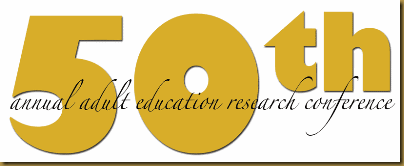Ted McCadden (at Penn State) discussed how identity formation occurs through performance work, especially with pop culture and mass communication.
He uses psychoanalytic branches of transformative learning theory (Boyd and Myers, Dirkxx) and critical media literacy as the theoretical overview. Take the transformative learning model and add on how the receiver of the message who receives a message and acts upon it (from critical media literacy and method acting). Add to this how the actor is involved in the process.
American theatre either reflects American culture or satirizes it. In this way, theatre can reinforce the entire hegemonic notions that it seeks to criticize. He is showing various video clips (not a single one, surprise . . . surprise, do I recognize!).
Method acting has an actor in the center of the I / Me / Character, so the actor feels and experiences what the character is experiencing, in order to make it convincing. How does a character portray something about which they have no experience.
Transformative learning theory focuses on the positive, though what happens when there is negative learning or negative experiences? God questions that were just raised and about which I need to think a lot about.
The discussion around what rights people have with transformative learning, when frames of reference are intentionally challenged.
Verisimilitude—your culture that is the recipient of the message must understand your message. Really interesting concept from method acting.
I think I need to know more about critical media literacy. This is around the mass media, so the people who are receiving the messages are interpreted in our own ways through our own lenses.
